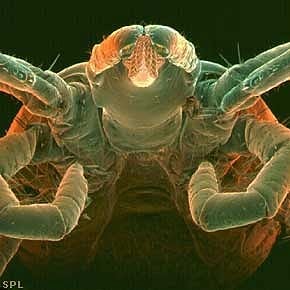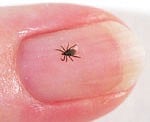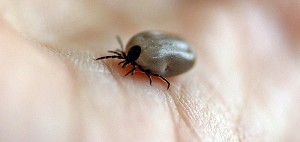
Doctor, doctor, I've been bitten by a tick! Am I going to die?
No. Stop flapping. Sit down. What's the problem?

I found 10 ticks on me after doing the LAMM – won't I get Lyme disease?
Highly unlikely. It's true that in some areas of the UK, 30% of ticks carry the bacteria Borrelia Burgdorferi (Bb) that causes Lyme disease. And many popular UK and European climbing areas are known to have Bb-infected ticks (see here for a list of UK infected areas). But even if you've been unlucky enough to be bitten by an infected tick, it still doesn't mean you'll catch Lyme – many believe an infected tick has to be on you for over 24 hours to transmit the bacteria in their saliva. Only around 300 cases a year in the UK are lab-confirmed, although the Health Protection Agency estimates that the real numbers are 1-2000 cases per year. Which isn't very high, is it?
But didn't you catch it?
Ah. I need to make two little confessions: I got bitten by a single tick, once, in Font, in March. It was on me for less than 12 hours. I developed symptoms of Lyme 2 weeks later.
And the second confession?
I'm not a real doctor, but I spent 4 months trawling the internet and medical journals for information. Much of it was contradictory, some was written by 'hysterical victims', and a tiny bit was excellent, peer-reviewed and referenced medical papers I could use to persuade my doctors to treat me adequately.
Right then, what are the symptoms?
Well, the most often quoted symptom is the classic bull's eye rash ('erythema migrans'). Usually it's sited on the tick bite site and appears 2 – 40 days after being infected. At first you'd probably find the bite site going red and inflamed, and this expanding over time, whilst the central part of the ring clears to look like normal skin. Kind of like an expanding pinky-reddy-brown polo mint. Or like ringworm. It is the one sure-fire symptom of Lyme disease, so if you develop one take a photo of it to take to your doctor: although some remain for weeks, others disappear in hours.

So what are the other symptoms?
Unfortunately it's not that simple – as Bb can infect absolutely every part of the body (particularly liking to hide out in the eyeballs, apparently), there are a myriad of symptoms attributable to Lyme. Perhaps the most common are: severe headache, muscle pain, stiff sore joints, stiff sore neck, fatigue, nausea and generally feeling very ill!
So what do I do if that happens to me?
Go straight to your GP. In some parts of the country, GPs may already be aware of Lyme. In others, you may need to persuade your doctor that Lyme is a possibility. They will undoubtedly want to take blood samples from you, to rule out other possibilities with similar symptoms. There is a blood test in the UK for Lyme but it is acknowledged as having a very high rate of false negatives. It is also affected by prior antibiotics, and won't show Bb for up to 6 weeks after infection. So, there is no definitive test.
If your GP suspects Lyme, they should begin antibiotic treatment right away, without waiting on the blood test results. This will probably be your biggest problem. All the medical textbooks say that taking 200mg of doxycycline a day for 10 days will cure you. However, virtually all recent medical studies disagree, suggesting that 400mg for 4-6 weeks is needed. They advise taking the meds for 4 more weeks after your symptoms disappear, however long that takes, to ensure that all the bugs are killed – Bb spirochetes have a lifecycle of around 28 days.
Taking such a high dose of antibiotics for so long will probably cause you some side effects. I took doxycycline for 2 months and suffered a burning stomach, oral thrush, nerve damage in my arms and legs and severe sunsensitivity – I sunburned under my fingernails and blistered in 10 mins under SPF50+ sunblock. This might explain some doctors' reluctance to hand out sufficient antibiotics willy-nilly.
If you do undertake a long antibiotic regime, don't forget to eat a low yeast and sugar diet (ie keep off the alcohol!) and supplement with probiotics to re-colonise your gut.
Will I be ill long?
How long is a piece of string? The earlier you detect Lyme, the faster you'll recover and the more likely you'll be cured. To give you an idea, I got bitten on 30 March, got the first symptoms on 13 April, was on antibiotics from 18 April – 22 July. I started feeling a little less like death warmed up by 11 July and climbed Scafell Pike on 24 July.
Right, so can I have antibiotics now, then, just in case? I'm happy to risk the side-effects.
Not so fast. Despite all I've said, the chances of you catching Lyme are still absolutely tiny, whereas the chances of getting bad med reactions are quite high. Best you sit tight for up about 6 weeks after your tick bite. If you get a rash or flu symptoms, get back here sharpish. Otherwise, forget about it, relax, go out climbing.
Well, how can I stop panicking like this again?

- Keep your arms and legs covered.
- Walk in the middle of paths to avoid brushing against ticks ready to ambush you in the bracken.
- Make sure you check your clothes and skin frequently – ideally check a buddy and get them to check you all over, every 3-4 hours. They're large enough to be easily spotted in summer, but you need to look carefully in spring – they'll be as small as the dot on this 'i'.
- You could try wearing insect-repellent, but there are none proven to repel ticks.
- If you find ticks, remove them correctly – don't use your bare fingers! The bacteria from the tick's burst guts and saliva can still infect you. Don't use Vaseline, cigarette lighters, or twist the tick as you pull it out – it could transmit Bb as it regurgitates. Best to use straight edged tweezers, gripping the tick as close to the head as possible.
Ta, doc. Anything else I need to know?
This article only covers the absolute basics. When it was first published in 2007 we included a lot of relevant links to places you can go for further information. Unfortunately all these links have now died due to people not properly updating their web sites with efficient redirects. So our advice now for further reading is to stick 'Lyme disease' into Google.














Comments